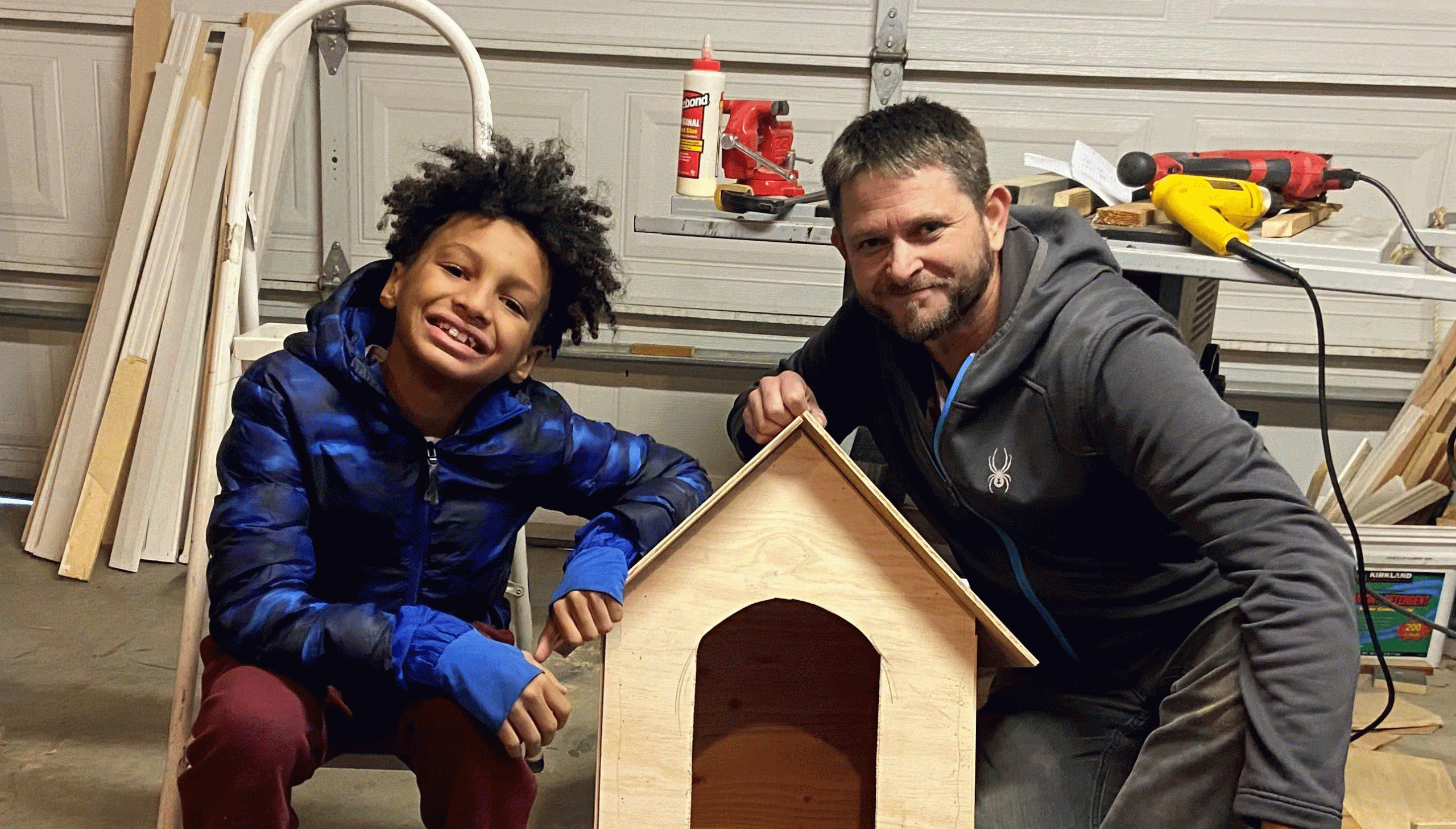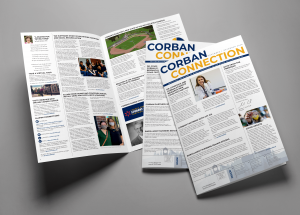Forging New Connections: Alumni Todd and Brian Start Forge Youth Mentoring Ministry
Todd Kleppin’s (’93) journey toward youth mentoring initially had very little to do with youth. After helping his church team with the city to build a state-of-the-art skate park on their property to connect with and serve the youth of their community, Todd was surprised to see each day that, among the 100-plus kids who flocked to the park, there was never an adult in sight. This prompted him to actively encourage the congregation to sit on a park bench and see if a kid would come up and talk with them.
“A few weeks later, I had a lady in her mid-80s come up and talk to me,” Todd remembers. “She said that she took my advice and within the first half-hour of sitting there, she had three middle school boys come up and talk to her.” It was a stark symbol of the starvation for meaningful adult interaction that he had witnessed among teens in youth ministry. “That was where God said to me, ‘Time to wake up.’ It’s a totally different world.”
Todd began to reflect on his ministry goals, asking God how he might better meet the needs of the kids in his community. His prayer and research began to move him from his role as a youth pastor toward youth mentoring—the uncommon image of an 80-year-old woman engaging with middle school boys still fresh in his mind.
Over the next few years, Todd stepped steadily into his new calling, eventually landing in the role of Director of the Christian Association of Youth Mentoring (CAYM), an organization that provides mentorship training to churches interested in starting mentorship programs. It was soon after that he was reunited with Brian Vaughan (’91), a fellow Corban graduate and current CPA with a practice outside of Portland, Oregon.
“I had always kind of followed what Todd had been doing through the years,” Brian says. Todd and Brian were teammates on the Corban men’s soccer team back when they attended the University. Even before they had considered mentoring as an official ministry course, it was on the soccer pitch that they had first encountered its impact.
“Corban provided my first real experience with discipleship and mentoring,” Brian says, remembering the spiritual accountability shared among teammates. “When I look at my own personal growth as a believer, it’s tied to those individual relationships where someone was coming alongside of me, investing in me, and pushing me.”
When Todd’s work with CAYM sent him toward the Portland area for a series of meetings, he stayed with Brian, who volunteered some consulting and strategic planning advice for CAYM. Brian posed the idea of a mentorship model that wasn’t tied specifically to a single church or pastor. “As opposed to going into a community and doing the training to launch a program with one church that won’t have any carry over, why don’t we form an executive leadership team, go into that community and bring all the churches together so that they can all take ownership of that program in their own community?” Brian suggested.
Todd and Brian took the idea and ran with it. “I always thought that I was the big visionary guy,” Todd says, “and then I get around Brian and this guy pushes me way out of my comfort zone, and I love it.” Fast forward two-and-a-half years and Forge Youth Mentoring is helping churches and individuals make an impact throughout Washington, Oregon, and Hawaii, with plans to expand further.
Forge’s unique approach, helping to identify and support organizations and individuals and equipping communities with the capacity to serve beyond the borders of a single church, has been a major reason for its quick expansion. “One of our main focuses is that church staff already have way too much on the plate,” Brian says. “So, let’s not add anything to it, but let’s help take the members of their congregations who are ready for mentorship and plug them into the secular community.”
Forge accomplishes its mission by networking with multiple churches, connecting with people in these congregations, and matching them with at-risk youth. “We want to come in and help pastors provide a ministry, but we can do all the work, and let God claim all the glory,” Todd says. “My hope is to stir up the average person in the pews. The cool thing about mentoring is that it pulls a lot of people who don’t normally serve. You don’t have to have special skills or a dynamic testimony. You just have to be willing to let God use you.”
For Todd and Brian, the need for more dedicated involvement from the church community has never been more dire. “We adults simply do not understand that the world is completely different for kids today in light of adult connection,” Todd says. “We think that kids today have the same adults we did, and the truth is they just don’t.” With 42-55% of kids being born to unwed single mothers, coupled with the ever-present effects of divorce, Todd sees a growing void for today’s youth. “Not only are they missing a second parent, but they are missing all the extended family that comes along with them.”
The problem has only been exacerbated by societal trends and patterns of abuse that often stem from the same sort of long-term relational brokenness Forge is trying to address. “In a society where everyone is scared of lawsuits, teachers and coaches are pushed away from the personal connection they used to have with kids because it’s dangerous,” Todd says. “I believe the average kid has less than three adults that they feel they can trust enough to turn to.”
Brian sees youth mentorship as the root treatment to this relational epidemic, transcending generational gaps. “We adults have a really difficult time doing discipleship with each other,” he says. “We’re afraid of it.” Through youth mentoring, Brian and Todd hope that reinstating a pattern of biblical discipleship early on, with intentional interaction at its crux, will lead toward healthier adult-to-adult relationships in the future. “It’s a starting spot because, if a youth has a mentor in their lives, when they get older, they may feel more able to come alongside another adult later on in life.”
Even though Forge has only been running for two and a half years, Todd and Brian have already begun to see the incredible impact that mentorship programs can have on a community, for mentees and mentors alike. And it begins with the church. “I look at it as an amazing opportunity for the church to lead the way in shaping the future,” says Todd. “And these kids want it. It’s not an issue of wrangling up enough kids to be mentored. There are thousands of kids in every community who want meaningful connections with adults.” Their efforts have already begun to verify the formal findings that kids are twice as likely to stay in and succeed in school while staying off of drugs when given a dependable adult influence in their lives.
The process has been rewarding for adult mentors as well. “We’ve seen that adults who become mentors actually begin doing more ministry in the church after they became a mentor than before,” Brian says. “We love to see adults also find their purpose and redeem their pasts and use them to help kids overcome their challenges.”
With adults and youth benefitting from church-guided youth mentorship, the secular world has begun to taken notice. Forge’s work has been recognized by multiple secular outlets, including Harvard University’s Leadership Institute for Faith and Education, for the groundbreaking ways they have been able to help equip and mobilize program leaders and mentors, particularly from Hispanic communities.
Through their ministry, Forge has offered another avenue to heal divides between sacred and secular communities in the towns and cities where they serve. “This is a way for us to go into communities and instead of doing something in a separate building or handing out food one day of the week, we get to make a visible, material change in the lives of people in the community,” Brian says.
As a result, Forge now has secular schools and agencies actively seeking help from their partner churches, requesting mentors for their kids in public schools. “The church has the opportunity like never before to lead the way,” Todd says. “When we go into a community and offer a mentoring program and we say we are teaming with the churches, that means the churches are solving the greatest problem in that community. The world gets to see the Church as the ones solving problems, not causing them.”
Looking toward the future, Brian and Todd’s dream is to expand further into Oregon and Idaho, down the I-5 corridor into Salem and Portland, where Brian lives. “If there’s a community that says, ‘We’re interested,’ we’re there,” Brian says. “We were able to launch on the island of Maui during COVID. Why could we not make it happen in Salem?”
Because Forge Youth Mentoring can offer their services at a third of the cost of most other agencies, they see incredible flexibility for God to be able to direct them to new connections and new communities as needed. One of those new connections is an old connection for Brian and Todd, as they look to partner with the University that first impressed the prominence of mentorship on their hearts.
“It would be great if we could team with Corban grads who have their own churches that want something like this in their community or for their congregations,” Brian says. “And we don’t need their resources. We don’t need their staff, or their monetary contributions. We just need them to partner with us and encourage their people from the pulpit, and we will take it from there.” As Forge looks to expand toward Salem, Todd hopes that soon they will also be able to offer internships and service opportunities to Corban students, fostering in them a passion for lifelong discipleship.
Every day, Todd encounters fearfulness from adults who believe they have nothing to offer. “We’ve bought way too much into the media telling us that kids don’t want us around,” he says. “But when a sweet old lady can sit at a skate park and have multiple middle schoolers come to her, you know that’s not true. What do they have in common? She doesn’t skateboard, and they don’t crochet. But these kids are desperately looking for someone who has life experience who can show them how to get the most out of life.”
For Brian, the calling is clear. “If we claim to be followers of Christ and do what He’s done, then who are our 12 today that we are training to go out and find their 12?” he says.
For Todd, the formula is simple. “Take one hour out of your week and have fun sharing what what you love to do,” he says, “fishing, gardening, cooking, or just walking in the park. God wants to use your story to shape their story by telling His story.”
If you are interested in discovering more about Forge Youth Mentoring or want to find a way to get involved, visit their website at https://forgeyouthmentoring.org/


